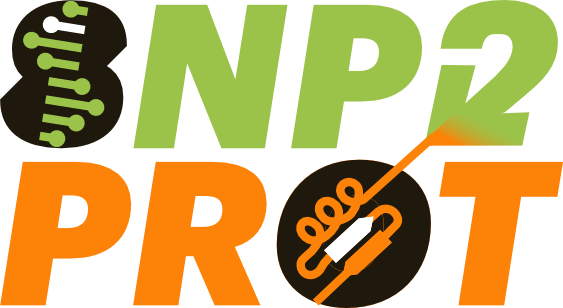Curriculum for the Integrated Research Training Group (IRTG) of SNP2Prot
Scientific training modules
Transferable-skill training
Laboratory rotations
Other activities
Concept of staff and organisation
Supervision and quality management
Environment of the Integrated Research Training Group
1 Summary
The highly interdisciplinary nature of the CRC requires extensive expertise in plant molecular biology, structural protein biochemistry and computational methods. PhD students will therefore need to acquire a broad understanding of all disciplines involved to efficiently progress in their project.
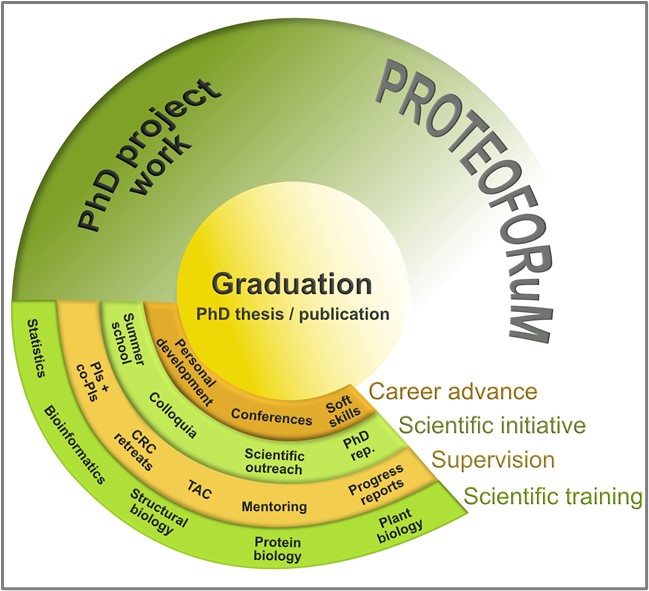
The integrated graduate research training group (IRTG) ‘PROTEOFORuM’ provides a structured framework that combines scientific and transferrable skills training with an optimised support system ensuring the quality of research and aiding PhD students progressing towards graduation and further career development.
The IRTG relies on the following pillars:
- Thesis advisory committee (TAC) and interdisciplinary mentoring
- Scientific training modules
- Transferable skills training
- Laboratory rotations within the CRC
- Additional essential activities (e.g., participation in scientific seminar series with renowned external speakers, participation in and organisation of meetings and conferences, etc.)
Upon completion, each doctoral student will receive a certificate that lists their specific activities within the IRTG training programme.
2 Programme curriculum
The IRTG curriculum comprises structured supervision elements, scientific and transferable skill training, laboratory rotations, scientific seminar and conference participation, and additional activities (see Table 1 below).
As part of the training program, each doctoral candidate has to complete a minimum of 4 credit points (CP) of scientific training modules, 2 CPs of transferable skill courses, 2 CPs of activities, and a rotation in another CRC member laboratory of approximately 1 month (5 CPs). A CP is equivalent to approximately 25 hours of work (comprising contact and individual study) according to the European Credit Transfer System (ECTS).
Scientific training modules
Scientific training modules: Scientific modules are tailor-made to CRC-relevant topics and taught by the PIs or experienced postdocs of the CRC and external experts with complementary expertise. Modules are sorted into mandatory general science (e.g., ‘data management’, ‘good scientific practice’, ‘GMO regulations’, etc.) and numerous facultative courses which are categorised by discipline.
In some cases individual PhD students or early career postdoctoral researchers may require training in highly specialised topics which are not relevant for a larger group of participants. In such cases, attendance in specialised external courses will be made possible upon request and availability of funding. At the end of their thesis work, all students must have completed modules from different disciplines (plant biology, protein biochemistry, bioinformatics) to equal shares which ensures a comprehensive education in all areas of CRC topics. As several members of the CRC consortium are located outside of Halle, scientific training seminars will (mostly) be held online.
Transferable skills training
The graduate programmes of the institutions involved in the CRC have all established a structured graduate programme infrastructure over the past years. The International Graduate Academy (InGrA, https://www.ingra.uni-halle.de) and PhD network of MLU (https://www.international.uni-halle.de/international_office/…), the Research Academy Leipzig (RAL) of UL (https://www.ga.uni-leipzig.de), the DoCou of the IPB (https://www.ipb-halle.de/karriere/…), and the IPK graduate programme (https://www.ipk-gatersleben.de/karriere/…) offer a wide variety of transferable skills courses which are accessible for graduate students of the IRTG. In addition, the IRTG enable the doctoral students and postdocs to suggest courses for additional training in areas/topics not provided by any of the institutions or apply for the possibility to get individual coaching or attend a specialised training course that is not of general interest but would benefit the individual project/person. Furthermore, the IRTG supports the attendance in German classes for interested participants. Suggestions for IRTG-specific courses or applications for individual coaching/course participation outside the graduate programmes can be made to the IRTG or CRC coordinator which will make decisions on approval based on sufficient demand in agreement with the CRC steering committee. For individual coaching or course participations, the applicant can address the IRTG coordinator with a letter of motivation that outlines the benefit/necessity of the selected coaching/course for their personal and/or professional development. Approval is pending on available funds from the IRTG and/or the general CRC funds.
Laboratory rotations
Doctoral researchers are expected to perform a laboratory/group rotation (~ one month) in another CRC group. Students with a focus on plant biology must conduct at least one rotation in a protein lab and vice versa. The rotation can be performed in the lab of the partner PI or other CRC labs and can be conducted as one block or several shorter intervals that add up to one month. Naturally, students may choose to add additional rotations/stays in more laboratories if it benefits their project work.
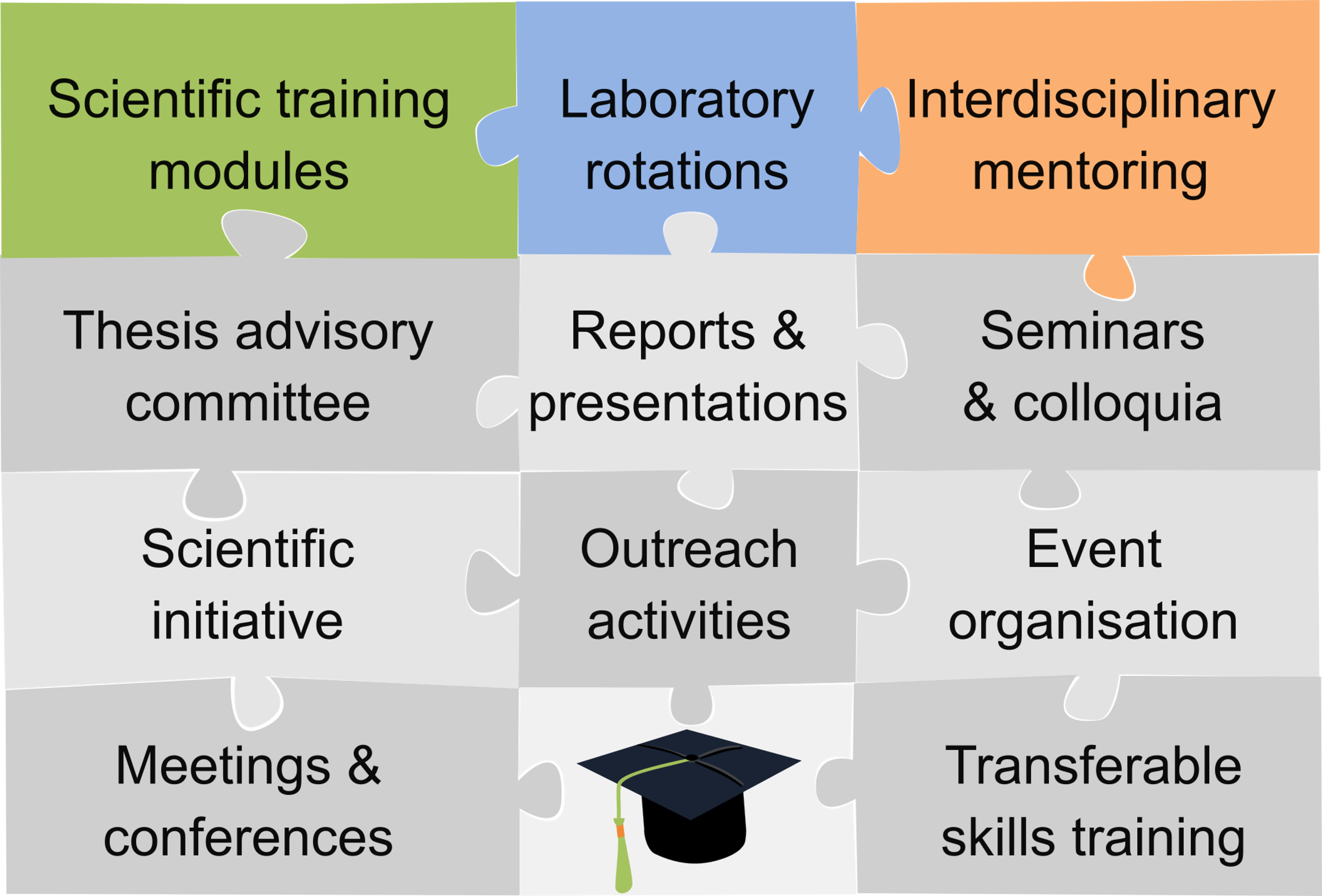
Other Activities: In addition to formal training in specific aspects of scientific or transferable skills, the IRTG encourages doctoral students to participate in a number of activities that expand their professional network, hone their organisational skills and practise their professional communication skills:
Seminar series (Colloquia) with internationally renowned external speakers
IRTG doctoral students are expected to participate in the CRC seminar series in which internationally leading scientists working on CRC-relevant topics will present their work. IRTG students should assist in inviting speakers in coorperation with their supervisors. The guest speakers in the CRC seminar series will be assigned to one or two PhD candidates who will chair the seminar and organise the ‘meet the speaker’ session in which the external experts will be invited to engage with the students to discuss their scientific work and career plans in an informal setting after the seminar.
Meetings and conferences
Each doctoral student must attend at least one (international) conference in which they present their respective data during the course of their graduate studies as these are integral parts of scientific communication and exchange. Financial support for conference costs can be individually requested at the CRC and IRTG office. In addition, students are encouraged to attend the annual Plant Science Student Conference (PSSC) organised alternating by graduate students of the IPK Gatersleben and IPB Halle. Students must also attend the international meeting organised by the CRC in 2027.
Retreats and Summer Symposium
Bianual CRC retreats will take place locally (Halle/Saale, Gatersleben, Leipzig) or at an external conference venue for approx. two days. Participation and active contribution to the regular retreats is expecteted for all CRC members. IRTG graduate students and CRC postdocs will further be expected to organise a CRC summer symposium (instead of a second retreat) presumably held in 2026.
Scientific outreach
PhD students can engage in various scientific outreach activities to promote science education and awareness among different audiences. They can participate in ‘open science’ events such as the annual ‘Lange Nacht der Wissenschaften’, organise interactive workshops for high school students in the framework of the ‘girls and boys day’, participate in ‘science slams’, create science-themed blogs or podcasts. Public outreach activities can highlight key scientific concepts or make complex ideas more accessible to a broader audience. Students should coordinate their activities with their immediate supervisor and IRTG and CRC coordinators to ensure a code-of-conduct and crediting of activities.
Teaching assistance
Since teaching is an important part of an academic scientific career, PhD students may engage in different teaching activities (participation in practical course supervision, supervision of Bachelor thesis work, etc.) as long as the time investment does not infringe significantly on their regular PhD thesis work.
| Category | Example topics | CPs* |
|---|---|---|
| Scientific training modules | 4 | |
| General science (topics in bold will be mandatory) | Good scientific practice, data management (DataPlant introduction and selected courses regarding specific applications such as structure data, proteomics, transcriptomics, phenomics), GMO regulations, grant applications, career fairs (e.g., ‘science meets companies’), etc. | 1 |
| Plant biology | Plant phenotyping; functional analyses of proteoforms in planta; phylogenetic analyses; introduction to quantitative genetics; databases and tools in plant biology; imaging techniques for protein localisation; plant transformation techniques; CRISPR/Cas9; ChIP/EMSA and transactivation assays to assess transcription factor function, etc. | 1 |
| (Structural) biochemistry | 3-D structural analysis of proteins: NMR; protein crystallisation, x-ray analyses; structural mass spectrometry (cross-linking/mass spectrometry); native mass spectrometry, H/D exchange); computational modelling of protein structures; cryo-EM-based structural analyses; principles in structure-function analyses; common tools and databases for structural protein analyses Protein biochemistry: Golden Gate based modular cloning; strategies to optimise soluble protein expression; protein mass spectrometry; heterologous protein-protein interaction analyses; native mass spectrometry to study protein-ligand interactions; in vitro methods for enzyme characterisation, etc. | 1 |
| Bioinformatics | Computational omics approaches; basic and advanced statistics; introduction to R; advanced data analyses in R; principles and applications in computational structural biology | 1 |
| Transferable skills training | Professional communication, scientific writing, presentation workshop, time and project management, gender and diversity awareness, mental health, conflict management, etc. | 2 |
| Lab rotation | approx. 1 month | 5 |
| Other activities | 2 | |
| Scientific seminars | Participation in 10 seminar series talks and ‘meet the speaker’ sessions | 1 |
| Conference participation | Presenting a poster or talk at an international conference | 1 |
| Event Organisation | Summer symposium, international CRC conference | 1 |
| Teaching assistant | Assisting in lab classes or supervision of BSc/MSc research projects | 1 |
| Scientific outreach activities | Social media, PR events (‘Lange Nacht der Wissenschaften’) | 1 |
| PhD representative | Acting as elected PhD representative in steering committee for 2 years | 2 |
* A CP is equivalent to approximately 25 hours of work (comprising contact and individual study) according to the European Credit Transfer System (ECTS).
PhD students and their immediate supervisors are responsible for correct documentation of the candidates´ activities within the CRC programme curriculum. Records of curricular activities must be signed by the respective PI and will be collected (bi-)annually by the CRC and IRTG coordinator (a record form will be provided). Upon completion of the program, each PhD candidate will receive a certificate that lists their individual course participation and activities.
3 Management and supervision
Concept of staff and organisation
The actions ofthe IRTG ‘PROTEOFORuM’ is steered by a committee, comprising the IRTG project coordinator Dr. Carolin Delker as an experienced molecular plant biologist, the support coordinator Dr. Bodo Moritz with a background in protein biology, the CRCcoordinator Dr. Julia Grimmer, the administrative coordinator Grit Zakschewski and the PhD representative elected by the doctoral students. The IRTG committee will meet at least once a month to discuss and decide on organisational matters (seminar and workshop organisation, requests, etc.). Individual responsibilities of the IRTG committee members are:
IRTG coordinator: The coordinator serves as a central point of contact for PhD students, PIs and the CRC steering committee in all matters involving the PhD curriculum. The coordinator ensures smooth communication flow among stakeholders, will support student initiatives and requests towards the CRC steering board, will monitor the curricular activity and will assist in resolution of conflicts.
Support coordinator: The support coordinator will assist the IRTG coordinator in ensuring smooth running of the IRTG curriculum and aims. Specific tasks will be regularly divided among the coordinators in the monthly IRTG committee meetings.
CRC coordinator: The CRC coordinator will ensure efficient integration of the IRTG in the general CRC infrastructure. They facilitate communication among stakeholders, will aid in documentation and monitoring of PhD student curricular activities. The CRC coordinator will organise the CRC retreats and the seminars given by external speakers which can be suggested by PhD students and other CRC members.
PhD representative(s): PhD students will elect one representative and two deputy representatives every 2 years. The PhD representative (and deputies) will advocate the interests, concerns, and initiatives to relevant stakeholders. A PhD representative will attend the IRTG and CRC steering committee meetings to communicate the specific topics and will disseminate the information among PhD students.
Administrative coordinator: To efficiently integrate the IRTG administration into the general CRC framework, the CRC administrative coordinator will support the IRTG coordinator, especially in all matters regarding financing and distribution of information (e.g., regarding invited speakers, CRC meetings, etc.).
Contacts of the coordinators
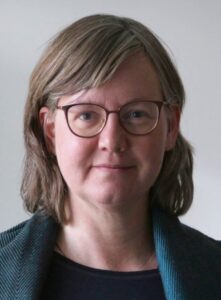
IRTG Coordinator
Dr. Carolin Delker
MLU Halle-Wittenberg
Inst. of Agricultural and Nutritional Sciences
Betty-Heimann-Str. 5
06120 Halle (Saale)
Phone: +49 (0)345 55 22 629
Email: carolin.delker@landw.uni-halle.de
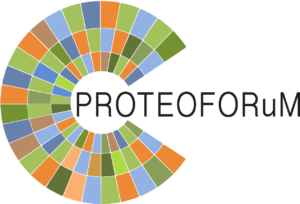
Support Coordinator
Dr. Bodo Moritz
MLU Halle-Wittenberg
Institute of Biochemistry & Biotechnology
Weinbergweg 22
06120 Halle (Saale)
Phone: +49 (0)345 55 25 955
Email: bodo.moritz@pharmazie.uni-halle.de
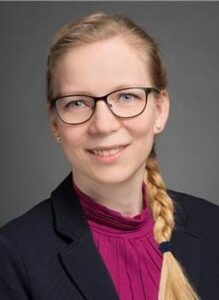
CRC Coordinator
Dr. Julia Grimmer
MLU Halle-Wittenberg
Inst. of Agricultural and Nutritional Sciences
Betty-Heimann-Str. 5
06120 Halle (Saale)
Phone: +49 (0)345 55 22 605
Email: julia.grimmer@landw.uni-halle.de
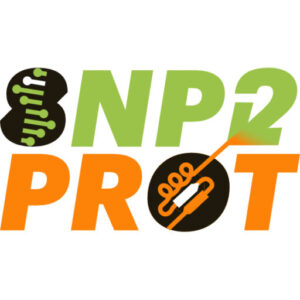
Administration
Grit Zakschewski
MLU Halle-Wittenberg
Institute of Agricultural and Nutritional Sciences
Betty-Heimann-Str. 5
06120 Halle (Saale)
Phone: +49 (0)345 55 22 618
Email: grit.zakschewski@landw.uni-halle.de
Supervision and quality management
All PhD students working in the projects of the CRC are members of the IRTG and will complyto the doctoral regulations of their respective Faculties of Natural Sciences I-III of the MLU (or UL). Supervisors and their PhD students will sign and adhere to a SNP2Prot supervision agreement that state their individual responsibilities with regard to the doctoral programme. The progress of individual PhD projects will be supervised by the respective PIs in regular 1:1 meetings and internal group progress reports. In addition, each doctoral student will select a thesis advisory committee (TAC) to discuss progress, problems and future direction of the project. In addition, each PhD student must write an annual report (see below) to be handed to the TAC and the CRC and IRTG coordinators. PhD students are expected to present the progress of their thesis work in the framework of the CRC retreats to promote their presentation and scientific discussion skills, provide a measure of quality control among research groups, identify collaboration opportunities and strengthen their networking skills.
Overview and details of supervision elements:
Supervision Agreement (SVA)
PhD candidates and their respective thesis committee member (see below) have to sign a supervision agreement which stipulates the responsibilities of both parties to ensure the best possible support for doctoral candidates towards the completion of dissertation research and successful conferral of the doctoral degree. Irrespective of the home institution at which the research work takes place, the doctoral regulations of the respective university and faculty continue to apply regardless of the SNP2Prot supervision agreement and take precedence over it in case of conflict. The supervision agreement must be filed with the IRTG coordinator within 6 weeks of the start of the PhD candidates´ contract.
Thesis Advisory Committee
Each doctoral student must be accompanied by a thesis advisory committee (TAC). The TAC plays a pivotal role in guiding and supporting PhD students throughout their research journey and ensuring an efficient ‘roadmap’ to complete their PhD thesis in the given time frame. The TAC includes the direct and associated PIs (plant and protein/bioinformatics science) of the students’ project and at least one additional mentor who may also come from outside the CRC. In addition, postdoctoral researchers of the CRC are encouraged to join TACs. The doctoral candidate is encouraged to select their committee independently within the first four months of their thesis work but thesis advisors will aid and support the selection if desired. The general TAC responsibilities are stated in the supervision agreement which needs to be signed by all TAC members, the PhD candidate and filed with the IRTG coordinator. If needed, alterations in TAC compositions during the PhD project development can be made (e.g., adding a new member), providing that these changes are filed with the IRTG coordinator. The TAC will meet twice a year to discuss the project progress, the current ‘location’ on the ‘roadmap to PhD’, and the annual written report of the doctoral candidate which is to be handed in prior to the meeting. Necessary adjustments of the report can be made according to the outcome of the TAC meeting prior to filing with the IRTG coordinator.
Annual Reports
Each PhD student must prepare an annual report which needs to be filed with their respective TAC members and the IRTG and CRC coordinators no later than 3 months after completion of the respective year. The format of the annual report changes each year to account for the different stages of project development and to promote efficient data processing and writing with regard to completing their doctoral thesis and summarising results for publication in scientific journals.
First year report will focus on summarising results only. Here, the main goal is to ensure that the PhD students can prepare high quality scientific figures with appropriate figure captions. Students must focus on selection of suitable data presentation, correct statistical methods, correct presentation and description of qualitative data (e.g., Western blots, microscopy images), etc. to ensure that they comply to the high demands of sound scientific data presentation from the start.
Second year report must be prepared as a manuscript for publication of data. Here the aim is to focus on the future publication of the data. At this point, the report should be written in a manuscript style eventhough it is not required that doctoral students have sufficient data for high quality publication already. This will highlight the areas in which data is insufficient and thus help to structure the work in year three in order to fill the gaps required for publication and thus promote efficient project development.
Third year report will focus on structuring of the doctoral thesis. Here the PhD students presents the outline of their thesis (i.e., table of contents style), write a short introduction to their project work, show at least ten figures with major results, outline the outstanding questions and which final experiments are to be conducted.
Annual reports will be submitted to the TAC members prior to their annual meeting and should be adjusted based on the discussion and agreements with the TAC prior to filing the report with the CRC and IRTG coordinators.
Environment of the Integrated Research Training Group
The IRTG will work in close collaboration with the graduate programmes of all institutions involved in the CRC. The International Graduate Academy (InGrA) and PhD network of MLU, the Research Academy Leipzig (RAL) of UL, the DoCou (IPB), and the IPK graduate programme are well established and the IRTG and CRC coordinator are in close contact with the respective coordinators and in the organisation of transferable skills courses. IRTG students and early career scientists have access to numerous information and networking opportunities (e.g., ‘Guides4docsMLU’ which provides comprehensive information for doctoral students enrolled at MLU, https://blogs.urz.uni-halle.de/ingra/…, ‘MLU Newcomers Club’, https://www.international.uni-halle.de/international_office/newcomers_club/, etc.), mentoring and central events and services, e.g., regarding ‘career development’, ‘integration of family and careers’, access to the university sports programmes and child care support (e.g., ‘Weinberg Kids’). All IRTG students should enrol as graduate students at the MLU (or UL) and must adhere to the doctoral regulations of the respective faculties.
